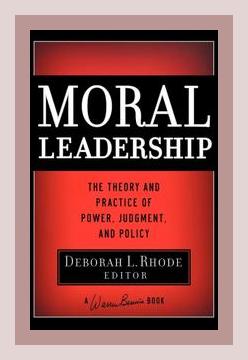Leadership and ManagementBusiness Law and EthicsEthical LeadershipBusiness Ethics
**
Introduction:
Deborah L. Rhode’s “Moral Leadership: The Theory and Practice of Power, Judgment, and Policy” is a comprehensive exploration of ethical leadership within the contexts of business ethics and broader societal norms. Rhode delves into the intricacies of power dynamics, the criticality of sound judgment, and the development and implementation of ethical policies. Her work integrates theory with practical approaches, making it a valuable resource for leaders at all levels.
1. Understanding Moral Leadership:
Rhode begins by defining moral leadership, which she describes as the integration of ethical principles with everyday decisions and actions. She categorizes moral leadership into three main components: ethical power, ethical judgment, and ethical policy.
Example:
Rhode discusses the case of Nelson Mandela, whose moral leadership in dismantling apartheid in South Africa epitomized ethical power and judgment.
Actionable Insight:
Develop a personal ethical code: Leaders should formulate and adhere to a personal ethical code that dictates their behavior, similar to Mandela’s unwavering commitment to justice and equality.
2. Ethical Power:
Ethical power involves using authority and influence to effect positive change. This power is not merely about control but about guiding others towards ethical conduct.
Example:
In the corporate world, Rhode cites the example of Ben & Jerry’s, which utilizes its corporate power to advocate for social and environmental causes.
Actionable Insight:
Advocate for social causes: Leverage your position and influence to support and advocate for causes that align with ethical principles, mirroring Ben & Jerry’s model of corporate social responsibility.
3. Ethical Judgment:
Ethical judgment pertains to making decisions that align with moral and ethical principles. Rhode highlights the importance of critical thinking and moral reasoning in this process.
Example:
She references the decision-making process at Johnson & Johnson during the Tylenol crisis, where the company prioritized consumer safety over profits by recalling all Tylenol products.
Actionable Insight:
Prioritize stakeholder welfare: In decision-making scenarios, prioritize the welfare of stakeholders, just as Johnson & Johnson did, ensuring that ethical considerations take precedence over economic gains.
4. Ethical Policy:
Ethical policies are frameworks or guidelines that govern behavior within an organization. These policies are essential for fostering an ethical culture and ensuring consistent ethical conduct.
Example:
Rhode discusses the establishment of the Sarbanes-Oxley Act in response to corporate accounting scandals, reinforcing accountability and transparency within organizations.
Actionable Insight:
Implement robust ethical policies: Develop and enforce robust ethical policies that promote transparency, accountability, and ethical behavior within your organization, similar to the principles underlying the Sarbanes-Oxley Act.
5. Leadership and Accountability:
Rhode emphasizes the importance of accountability in moral leadership. Leaders must be accountable to their stakeholders and to broader societal norms.
Example:
She points to the downfall of Enron, where lack of accountability led to unethical practices and ultimately, the company’s collapse.
Actionable Insight:
Establish accountability mechanisms: Implement mechanisms to ensure accountability within your organization, preventing unethical behavior and fostering trust among stakeholders.
6. Building an Ethical Culture:
Creating an organizational culture that values ethics is crucial. Rhode argues that leaders play a pivotal role in shaping this culture.
Example:
The consistent ethical stance of The Body Shop, founded by Anita Roddick, helped cultivate a corporate culture that emphasizes environmental sustainability and human rights.
Actionable Insight:
Champion ethical causes: Lead by example and champion ethical causes within your organization, nurturing a culture where ethical considerations are integral to decision-making.
7. Ethical Leadership in Crisis:
Rhode highlights the role of ethical leadership during crises, where moral clarity and steadfastness are paramount.
Example:
Rudy Giuliani’s leadership during the aftermath of 9/11, where his calm, moral fortitude and transparent communication provided much-needed reassurance.
Actionable Insight:
Maintain transparency in crises: During crises, prioritize transparent and honest communication, demonstrating moral clarity and calming stakeholders, akin to Giuliani’s approach post-9/11.
8. Gender and Diversity Issues:
Addressing gender and diversity is a critical aspect of moral leadership. Rhode notes the underrepresentation of women and minorities in leadership positions and the ethical implications of such disparities.
Example:
She draws attention to initiatives like Procter & Gamble’s diversity programs, which aim to create a more inclusive corporate environment.
Actionable Insight:
Promote diversity and inclusion: Actively promote diversity and inclusion within your organization, implementing programs to ensure equitable opportunities for all, reflecting P&G’s commitment to diversity.
9. Leadership and Ethical Challenges:
Leaders frequently face ethical dilemmas and Rhode discusses strategies for navigating these challenges.
Example:
The dilemma faced by whistleblowers in organizations, such as Sherron Watkins at Enron, underscores the complexities of ethical decision-making.
Actionable Insight:
Support ethical whistleblowing: Create an environment where ethical whistleblowing is supported and protected, encouraging employees to report unethical practices without fear of retribution.
10. Role of Education:
Education in ethics plays a crucial role in developing moral leaders. Rhode advocates for integrating ethics into educational curricula to prepare future leaders.
Example:
Harvard Business School’s curriculum includes courses on business ethics and corporate social responsibility to instill ethical thinking in future leaders.
Actionable Insight:
Incorporate ethics training: Integrate ethics training and education within your organization or academic institution to cultivate a strong ethical foundation among future leaders.
Conclusion:
“Moral Leadership: The Theory and Practice of Power, Judgment, and Policy” by Deborah L. Rhode offers an insightful and practical guide to ethical leadership. By understanding and applying the principles of ethical power, judgment, and policy, leaders can navigate complex ethical landscapes, foster a culture of accountability, and make decisions that positively impact society. Rhode’s robust examples and actionable insights provide a roadmap for individuals seeking to enhance their moral leadership capabilities, ensuring that their influence yields ethical and sustainable progress.
Leadership and ManagementBusiness Law and EthicsEthical LeadershipBusiness Ethics
